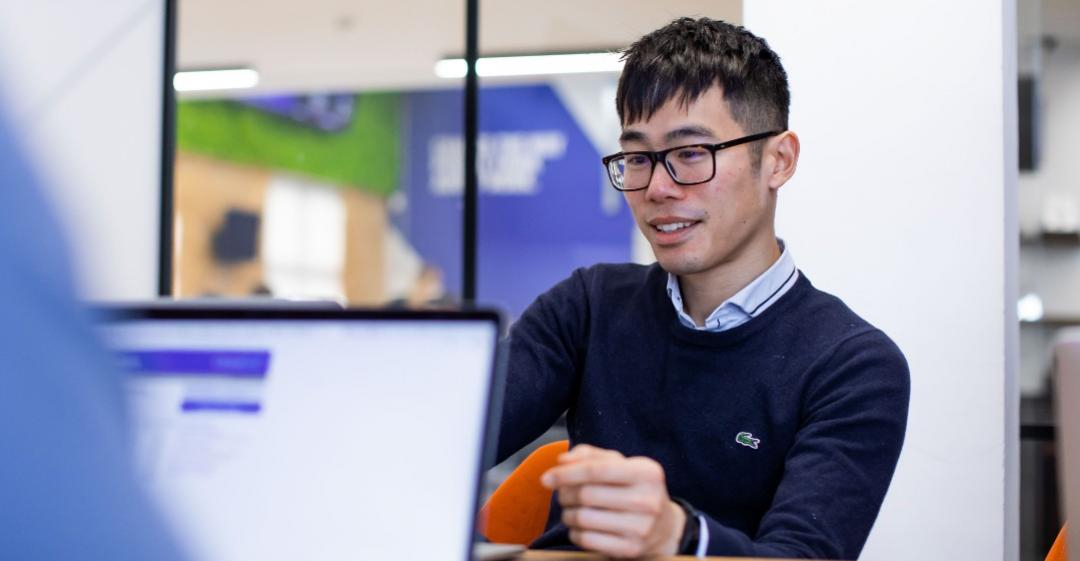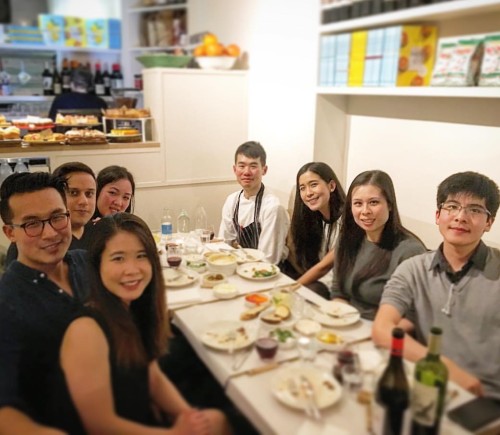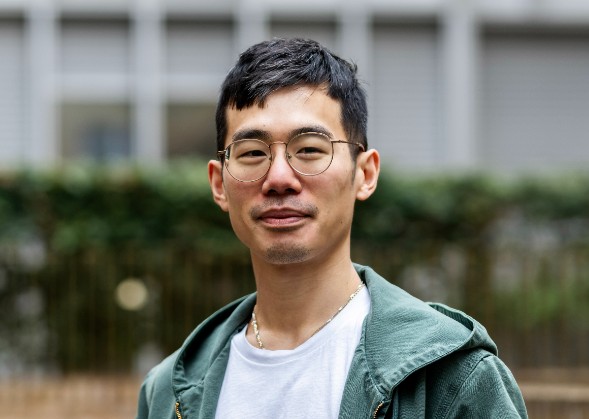“I didn't feel like my work contributed to society in any way.”

Newly Updated
What work were you doing previously?
I worked in corporate finance for six years at a leading consultancy firm, specialising in renewable energy and telecoms.
What are you doing now?
I set up a consultancy aimed at growing and scaling start-ups, and have worked with some amazing individuals and companies in the past five years.
Being self-employed has also given me the flexibility to pursue my passion in food. I worked as a chef in four of my favourite restaurants whilst also running my consultancy, and currently provide bespoke catering for special occasions.
How did you feel in your work before you decided to make the change?
Whilst I learned an incredible amount during my six-year stint in corporate finance, it felt like a career I fell into, rather than one that I was passionate about.
Despite having multiple responsibilities and senior leadership exposure, I didn't feel intellectually challenged, or fulfilled, at work.
I ended up taking on a bigger workload, but even this didn't make me feel anything.
At that point in my career, I just wanted to continue learning and pushing myself, but I didn't have a mentor or manager at the time who could give me this.
I also didn't feel like my work contributed to society in any way and remember feeling inadequate when compared to my friends who all had high flying jobs.
Why did you change?
I've always loved food and wanted to be a chef ever since I was a child.
However, as my parents run a takeaway, I knew first hand the sacrifices involved and therefore understood the need for a backup career - which is why I ended up in corporate finance.
I remember scrolling through Twitter one day towards the end of my corporate career and saw that Chez Bruce (one of my favourite restaurants) was looking for chefs, regardless of experience. Looking for a challenge, I decided to take a day off work and did a shift at Chez Bruce as a commis chef.
Whilst it was a frightening experience, I felt absolutely alive for the first time in years and was pleasantly surprised when they offered me a job.
This experience made me want more.
When was the moment you decided to make the change?
Seeing that I was capable enough to work in a professional kitchen gave me the confidence to apply to a few more of my favourite restaurants and I ended up with offers at Bao, Honey & Co and Bocca Di Lupo.
At this point I was addicted to the lifestyle of being a chef - there were no office politics, colleagues treated each other like family and, most importantly, I was learning something new every single day.
After six years in corporate finance, I had enough saved up to allow myself a sabbatical and I knew that I could always get another corporate finance role after a year out.
This safety net allowed me to accept an offer from Honey & Co, a beautiful Middle Eastern restaurant run by a lovely couple, even though I was taking a 70% pay-cut.
How did you choose your new career?
All my friends and family thought I was crazy for having a career change in my late 20s.
However, I knew that staying in a job doing the same thing for the next 30 years was not something I could live with, so the decision was fairly easy.
To compensate for the significant pay-cut, I also started my own consultancy company. Whilst it was an uphill struggle to get work initially, I built up a reputation on Fiverr and Upwork and eventually secured a few recurring contracts as a strategic consultant for high growth start-ups.
This also allowed me to keep in touch with, and retain, my previous corporate finance and consulting skill set.
Are you happy with the change?
Whilst it has been a difficult transition and I've had to make sacrifices to make it work, I'm really glad that I took the plunge - my corporate lifestyle was draining me and I didn't realise it at the time.
Looking back, the career change has not only given me many new skills, it has also opened my mind to accepting new opportunities: I distinctly remember taking two weeks holiday to volunteer on my own to help out on an off-road cycling race around Iceland, something I wouldn't have done in the past!
The flexibility that comes with having your own business now allows me to pursue my passions and also give back to the community by choosing to work on projects that do social good.
What do you miss and what don't you miss?
Working as a contractor can be lonely at times and there's a lot of admin involved.
I also don't have a manager, so making sure I have the right mentors around me is really important.
However, the flexibility to do what I want, pay myself what I want and work on projects that align with my ethos is something that I would never want to give up.
Working as a contractor also means that I can avoid office politics, which is definitely a big plus.
How did you go about making the shift?
I wrote down all the things that I wanted to do and broke this list down into smaller, manageable steps.
This included things like: financial planning, rewriting my CV, researching what life as a chef was really like.
I then spent some time talking to chefs and founders of consultancies to really understand what their lifestyles were like. What I found is that most people are willing to help you, so long as you ask nicely and are willing to put in the work!
I also wrote down a backup plan in case the transition didn't work out. Luckily I haven't had to use this yet.
What didn't go well? What wrong turns did you take?
I've had to learn to cope with working 18-hour days and have made a few personal sacrifices (e.g. not be able to attend friends' birthdays / stags due to work; working weekends, Christmas and New Year), but there hasn't been anything that has gone horribly wrong.
I think this is partly down to my preparation but also down to the fact that I knew what I was truly getting into. Doing trials in restaurants beforehand helped give me a taste of what my life would be like.
How did you handle your finances to make your shift possible?
Taking a 70% pay-cut wasn't easy so I'm glad that I had savings to rely on and that I had previously cut back on non-essentials (such as snowboarding holidays).
However, I also found that (in the right environment) hard work really pays off, as I was promoted three times in seven months as a chef. The associated pay rises made my life a little easier from a financial perspective.
What was the most difficult thing about changing?
The pace of work, even though it is what attracted me to the hospitality industry!
In an office, the pace of life is very steady and you are largely in control of the pace at which you work.
In a kitchen, however, the work load is huge and something usually goes wrong so you have to push your limits all the time.
What help did you get? 
I'm lucky that I chose my employers carefully and was surrounded by mentors and inspirational characters throughout my journey as a chef.
I'm also lucky that old colleagues gave me work as a consultant whilst I was still trying to build a portfolio. Without this, it would have been very hard to gain inbound consultancy work.
My biggest thanks, however, go to my friends and family who would let me stay over at their flats if I ended up working later than expected. I can't count the number of times I've had to wake them up at 3 a.m. to let me in!
What resources would you recommend to others?
LinkedIn, as it gave me a network of industry experts to get advice from.
Twitter and Reddit to find out what an industry is really like.
Fiverr to build up a portfolio of work.
Heat by Bill Buford and The Dip by Seth Godin as inspirational reads to make the change.
What have you learnt in the process?
To be open to change as it usually leads to unexpected opportunities.
I've also learned that karma is real, so be nice to people as karma pays dividends.
Most importantly, I've learned to embrace the fear of the unknown. That thrill is what makes life worth living.
What would you advise others to do in the same situation?
1) Do your research and dip your toes in first. I wouldn't have taken up a job as a chef without experiencing it for a few days beforehand!
2) Be prepared to work hard. It won't be an easy ride and you'll have to work harder than everyone else to make it happen.
3) Make sure that it's financially viable before taking the plunge otherwise you'll be forced to make decisions based on money, rather than passion.
We caught up with Alan recently to see how his shift was working out, roughly two and a half years on. Here's what he's been up to, and the biggest lessons he's learned.

What's changed for you in your career since we first published your story?
Wow, lots has changed since we last spoke about my squiggly career!
I've since left the cheffing world behind in order to find a better balance in my life. Strangely enough, this balance has come from having a fractional career that blends my past two careers.
I'm a consultant to startups, doing everything from fundraising for a kimchi manufacturer and being Chief of Staff of a tech company, to teaching at an Elon Musk school and building out a procurement function at an employer brand agency.
I also do private catering on the side to maintain my creativity.
If that wasn't enough on my plate, I've also just set up an education company (Collaboration Laboratory) that focuses on helping kids learn the skills that they need in future life (negotiation, strategic planning, ethical decision making) through games, projects and challenges.
How do you feel about your work now?
My portfolio career is great!
I love the freedom and ability to focus on people and projects that matter to me, I can take time off to recover/rethink/realign whenever I need, and I've met some wonderful people along the way.
It took me a while, but I've finally settled on a framework that works for me: I spend 60% of my time doing things that pay the bills, 20% of my time learning, and 20% of my time doing things that give me a sense of purpose (teaching, careers coaching, volunteering in a food bank).
I consider myself very lucky to have a bunch of understanding clients and also a group of lovely mentors who are able to keep me on track when I start veering off!
What challenges have you come up against since making your shift, and how exactly have you dealt with them?
I found the transition away from hospitality very hard.
I’d lost touch with some of the skills (e.g. financial modelling) that I had from the corporate world; it was hard finding my first client (thank you Grad Careers Coach and Tailify for trusting me!).
And not knowing my chef rota for the following week meant that booking in interviews and client meetings became very challenging.
My advice to anyone reading this would be to take your time and give yourself realistic timelines to transition – it won't happen overnight!
Since then, the biggest challenge is trying to find that work/life balance, and my 60:20:20 structure above has really helped.
How is the financial side of things panning out, and is this what you'd expected?
I've never been motivated by money but it's been much easier, financially, since leaving the world of hospitality as I can set my own day rate with my clients.
To be honest, I still don't understand pay in the hospitality sector. How are such a skilled, talented, hard working group of individuals paid less than an entry level graduate role.....
I think there needs to be an education piece on how much restaurants should charge, but the current cost of living crisis makes that difficult!
What have you learned, since making your shift?
Keep an open mind, try new things, be nice.
If I compare myself to my corporate self, I'm a completely different person!
Lunchclub, Operations Nation and daily yoga sessions have really helped me with the above and I'd recommend finding some daily routines that give you rhythm and purpose.
Is there anything else you'd like to share?
I've found the Careershifters newsletters really inspiring and full of practical advice.
It's also really exciting to see that there are many others out there on a similar path!
To find out more about Alan's work, visit www.collaborationlaboratory.com
What lessons could you take from Alan's story to use in your own career change? Let us know in the comments below.



